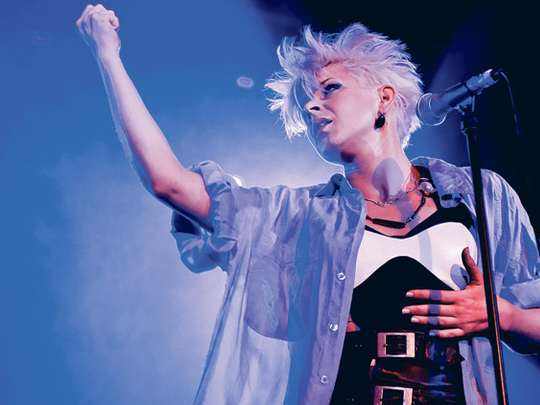
It's a warm Friday afternoon in Stockholm, and the city's students are celebrating the end of term. Robyn Carlsson slips unnoticed through the gathering crowd into a vegetarian cafe just down the street from Sweden's answer to Abbey Road: Polar Studios, where Abba laid down their run of hits. Her ability to walk around the city unmolested seems surprising: after all, Carlsson — known professionally by her first name — has been a star in Sweden since the age of 16.
This may have something to do with the fact that she has turned up in tomboyish mufti, dressed down in shorts and a T-shirt, which comes as a relief: one journalist sent to interview her found himself trying to direct searching questions to a woman wearing a large planet on her head. Or, alternatively, it may be simply down to that aforementioned Scandanavian equanimity. "People are unimpressed here," she says.
"It's a smaller country. That's why I've never moved or anything. It's easier for me to stay independent from my life as a famous person."
Robyn is in the middle of rehearsals, she explains, not for a tour, but as part of "an ongoing process". She elaborates: she is currently engaged in "an experiment to figure out a way of making music that fits my creative process and not the music industry's calendar, an opportunity to question the structure of how I make music".
Robyn doesn't sound much like her pop peers and she doesn't behave much like them, either. This year, she is releasing not just one, but three short albums.
The first record features, variously, a collaboration with Norwegian techno duo Ryksopp; a Swedish folk song called Jag Vet En Dejlig Rosa (I Know of a Lovely Rose); a huge, radio-friendly pop anthem called Fembots, addressing the distinctly un-pop topic of the 30-year-old singer's ticking biological clock; and a furiously shouty piece of electro called Don't F***ing Tell Me What to Do. It's called Body Talk Pt 1, which has led some critics to talk grandly of a musical trilogy, each with its own distinctive identity: the second is projected to feature a collaboration with rapper Snoop Dogg.
‘A bunch of songs'
Robyn shrugs. "The eight songs on the first album were just the ones that were finished by the time we had to send the CD to the factory. The working title for the first album was A Bunch of Songs. The second album was going to be called Some More Songs."
It's five years since Robyn wrested control of her own career after a decade as a kind of manufactured pop moppet, releasing her 2005 album Robyn. She started her own label, and worked with the kind of artists her previous paymasters would have baulked at — not least the avant garde techno duo the Knife.
It was still recognisably pop music, but substantially tougher and cooler than her former record label's project to market her as Sweden's answer to Christina Aguilera. The album won her three Swedish Grammies and a new international audience, which she characterises as "B Donka Donk girls from the Bronx, and hipsters, and nerdy goth kids and 35-year-old white males". It also spawned a UK No 1 single, With Every Heartbeat.
But the album's success meant that she ended up touring for the best part of five years, and suffered writer's block as a result. "When I came off tour, the idea of being in a studio for another year, making an album, touring it for three years, just felt depressing. I decided to release the album in parts so that I could get something out quicker, tour quicker and get back in the studio quicker. That's what the song Don't F***ing Tell Me What to Do is about. It's about me being my own boss."
‘Disgusted'
Her problems with the world of pop began almost immediately after her first big hit, the globally successful Show Me Love. She didn't enjoy "being interviewed by super-cheesy teenage magazines that were so far off where I was coming from".
"The pop industry, they just had one solution for everyone, and I felt quite disgusted by that. I started to rebel against it, but I never realised I could just not be in it. I was scared of being without a record deal. I was very, very lost for a while."
You do wonder how anyone thought she'd be a suitable candidate for manufactured pop stardom in the first place.
By her own admission, the fact that she did end up a pop star might have more to do with the sheer weirdness of pop culture in '80s Sweden than her suitability for the task. "You could get access to these huge American and British artists, but not the context, not the scene they were coming from, so you ended up inventing your own. I was part of a scene in Sweden called ‘the kickers'. We looked like skinheads crossed with LA gangsta rappers. You know when you see the Eurovision Song Contest and the Ukraine comes on, and it's some crazy guy shouting about Russia with a disco ball on his head? It's so tacky, but I understand where they're coming from because that's what Sweden was like."
She says she has to head back to the studio, to try to decide which songs will go on her second album of the year. "I don't know," she says cheerfully. "No one knows. Not even me."
It sounds like a risky strategy. She nods. She's not sure whether music figures in her long-term plans. "There's a part of me that sees myself going totally into what my parents did. I've got to figure out over the next 20 years whether I'm Tina Turner or someone else."
A couple of years ago, Robyn wound up supporting Madonna on the European leg of her Sticky and Sweet world tour. "It was like an out-of-body experience because I've been a fan of hers since I was kid, but also because of the big machine surrounding her. It was on a level that's just unreal to me. But it was very interesting and I learned a lot."
What did she learn? There's a pause through which you could drive a truck laden with Swedish students. "Just what you have to do to maintain that level," she says, and falls silent.
And that's not very appealing to you? "No." She smiles, and slips out into the street.










